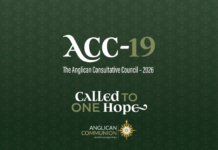The Diocese of Exeter and Exeter Cathedral have robust and persistent safeguarding provision, demonstrated by strong, skilled leadership, a supportive environment and a commitment to building a better safeguarding culture, according to an independent safeguarding audit published today.
The INEQE audit was commissioned by the Church of England’s National Safeguarding Team and is being conducted in each diocese and cathedral in England. Exeter is the 8th diocese and cathedral to be audited. All eight have received positive audit reports.
Examples of good practice highlighted in the Exeter Diocese section of the report include high levels of training compliance amongst clergy and lay ministers, good risk assessments, safety plans, safeguarding case management groups, lessons learned reviews, external and internal communications, and staff demonstrating curiosity, persistence and challenge in relation to safeguarding cases.
The report also found Exeter Cathedral to be actively promoting “a supportive environment where being curious and seeking advice about safeguarding is encouraged.” The report highlights the cathedral’s use of safeguarding awareness activities among committees, staff and volunteers, and effective management of the Cathedral Choir’s trips and tours, alongside good safeguarding requirements for visiting choirs.
The report said: “The Audit is confident the persistent approach of the Diocese Safeguarding Team towards its safeguarding functions contributes to making people safer across the Diocese… The Diocesan Safeguarding Team is exceptionally well led and comprises skilled professionals who are held in high regard, both internally and externally.”
Report Recommendations
While acknowledging the efforts to “foster a positive, supportive and safer environment for all,” the audit report also makes a number of recommendations for the Diocese of Exeter, and Exeter Cathedral.
These include better engagement with victims and survivors of abuse, improvements to the Cathedral’s internal communications, increasing the size of the safeguarding staff team, and providing more support and networking opportunities for volunteer Parish Safeguarding Representatives.
The audit report comes just three weeks after the publication of the Makin Review led to the resignation of the Archbishop of Canterbury over safeguarding failures in relation to abuse claims against John Smyth, a lay leader in the Church of England.
The Bishop of Exeter, the Rt. Rev’d Mike Harrison, said “This report is testament to our commitment to live out Christ’s call to love our neighbour by putting the safeguarding of children and vulnerable adults at the heart of everything we do. It is evidence that our safeguarding structures and management are of a high standard, and that our parish safeguarding representatives are doing invaluable work on the ground.
“We know there is always more we could be doing, and we will be carefully considering all the report’s recommendations, particularly how we can better engage with victim and survivor representatives. We are also investing in the safeguarding team with the appointment of a new Assistant Diocesan Safeguarding Advisor to build capacity. We will continue to work tirelessly to ensure that our churches are safe places for all and build on the work already done to foster a healthy safeguarding culture across the diocese.”
Exeter Cathedral
The Dean of the Cathedral, the Very Rev’d Jonathan Greener, said “I am pleased the report recognises Exeter Cathedral’s conscientious journey of positive change in safeguarding, with committed leadership and substantial improvements, as well as a growing culture of awareness among our clergy, staff and volunteers. We welcome the report’s recommendations to help us continue on this journey. Some of these are already in hand, including the recruitment of a dedicated cathedral safeguarding officer, and wherever possible, the others will be acted upon without delay.
“Going forward, we shall work harder at communicating what we have done and are continuing to do to keep Exeter Cathedral a safe place, a community of welcome, acceptance and love, where we can all be our best selves, the very people God made us to be.”
The audit was carried out this summer and included a review of 500 documents, interviews with victims and survivors, clergy and lay ministers, cathedral and diocese staff and volunteers, parish church officers (staff and volunteers), and external partners. 438 people also responded to an anonymous survey, including children and young people. There were also eight focus groups.
Creating a safer environment for all
Exeter Diocese was also one of the Pathfinder dioceses that piloted some of the IICSA recommendations around safeguarding team roles that have now been adopted nationwide. It was also commended in the INEQE audit report for having implemented all of the considerations of the previous SCIE audit in 2018.
Anthea Carter-Savigear, the Director of People and Safeguarding, said “We are pleased with the positive outcomes of the INEQE audit, which reflect the strength of our safeguarding framework and the progress made in creating a safer environment, especially for the most vulnerable. Whilst we celebrate these achievements, we remain mindful of the criticisms in the Makin Review and other reviews within the Church of England. Safeguarding is an ongoing journey, and we are committed to learning, improving and ensuring it remains a top priority. This progress is cause for celebration, but we continue to prioritise vigilance and action in creating a safer, more supportive environment for all.”
The Diocese of Exeter and Cathedral Safeguarding Advisory Panel (DSAP), which oversees safeguarding provision for the Church, will be meeting later this week to decide how best to take the audit recommendations forward.



